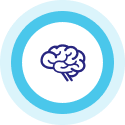Find Your Balance and Confidence Again.

CONTACT US
Book An Appointment
SCROLL

What is Vestibular
Rehabilitation?
The vestibular system contributes to the oculomotor system function(eye movement),postural system, spatial perception(where you are in space),attention, memory, mental imagery and social cognition. Among other things, this helps to keep our vision clear during head motion, maintaining blood pressure from lying to standing as well as reflexes to keep us upright. Consequently, a proper, or improperly functioning vestibular system can have a significant effect on how one feels.
Symptoms of Vestibular Disorders
Vestibular disorders can manifest in a variety of ways, often causing discomfort and
disrupting daily life. If you’re experiencing any of the following symptoms, you may benefit from our Vestibular
Rehabilitation program:
-
Dizziness and Vertigo:
Persistent feelings of dizziness, spinning, or unsteadiness can be a sign of a vestibular balance disorder. -
Vomiting:
In some cases, vestibular disorders can lead to vomiting, particularly when vertigo or severe dizziness is present. -
Reduced Ability to Concentrate:
Difficulty concentrating is a common symptom, often accompanied by a sense of disorientation. -
Anxiety and Depression:
The chronic nature of vestibular disorders can contribute to anxiety and depression as individuals struggle to manage their symptoms. -
Nausea:
Nausea, particularly when associated with changes in position or movement, can be a common symptom of vestibular issues. - Fatigue:
Vestibular problems often lead to fatigue due to the constant effort required to maintain balance and stability. - Visual Disturbance:
Visual disturbances, such as blurriness or difficulty focusing, can occur alongside vestibular issues.
Our vestibular rehab program aims to tackle these symptoms, enhancing your life quality.
Reach out to us for an assessment and start your path to relief.
Who Are Good Candidates for Vestibular Rehabilitation?
Vestibular rehabilitation is a versatile and effective therapy that offers hope and
relief to a broad spectrum of individuals facing various vestibular disorders and related conditions.
While the suitability of vestibular rehabilitation is ultimately determined through individual
assessments conducted by medical professionals, here’s a closer look at some common categories
of individuals who often benefit from this specialized therapy:
Individuals who have experienced traumatic brain injuries, whether due to accidents, falls, or sports-related incidents, frequently find vestibular rehabilitation invaluable. This therapy can help them regain balance, reduce dizziness, and enhance their overall quality of life.
Stroke can lead to a range of neurological impairments, including balance and coordination issues. Vestibular rehabilitation is often a crucial component of post-stroke recovery, aiding in the restoration of motor functions and helping individuals regain their independence.
Vestibular rehabilitation is particularly beneficial for those plagued by chronic vertigo. This condition can be disruptive and debilitating, but with the right therapeutic approach, patients can experience significant improvements in their symptoms.
Migraines are often accompanied by vestibular symptoms such as dizziness and vertigo. Vestibular rehabilitation can play a pivotal role in reducing the frequency and severity of these symptoms, allowing migraine sufferers to enjoy a better quality of life.
Meniere’s disease is characterized by recurrent episodes of vertigo, tinnitus, and hearing loss. Vestibular rehabilitation helps individuals with Meniere’s disease manage their symptoms and regain balance.
Benefits of Vestibular Rehabilitation
Join our program and you’ll see benefits like:
- Better Balance: Minimizing the risks of falls.
- Dizziness Relief: Through specialized exercises and tools.
- Increased Stability: Making everyday tasks smoother.
- Customized Treatment: Tailored specifically for your needs.
- A Non-Drug Approach: It’s all about hands-on therapy.
- Enhanced Life Quality: Gain more confidence and independence.
- Recognizing Your Limits: Understand and manage your symptoms better.
- Symptom Habituation: Gradually reducing motion sickness.
- Boosted Brain Adaptability: Helping your brain to compensate for disturbances.
Frequently Asked Questions
We’ve seen good results with vestibular therapy in many patients with vestibular issues, vertigo, inner ear disorders, and patients experiencing dizziness, imbalance and/or visual disturbance. When you visit the Broadview Spine & Health Centre in Ottawa and meet with your chiropractic neurologist, we’ll assess your conditions & issues, listen to your concerns and work together with you to develop the best course of action to meet your goals. This may very well include vestibular therapy.
The vestibular system is made up of parts of the inner ear and the brain that controls balance and eye movements. A vestibular order is a condition where the vestibular system is damaged, resulting in one or more of the following symptoms: Vertigo and dizziness, imbalance, vision disturbance, hearing change psychological symptoms. Vestibular damage can come as a result of disease, aging, or injury such as a concussion.
Vestibular disorders are often associated with symptoms such as dizziness, balance issues, motion sickness, visual disturbance, etc. Sometimes this can include nausea and vomiting, fatigue, and/or a reduced ability to concentrate for sustained durations.
Extended symptoms and indirect consequences of long-term effects of vestibular disorders can include psychological issues such as depression and anxiety. People with vestibular disorders tend not to move as much, and this physical inactivity can have significant consequences such as weight gain, muscle deterioration, weakness and other unwanted effects. That’s why it’s important to treat vestibular disorders early, so that symptoms and effects don’t spiral out of control to affect your entire lifestyle.
Once we do a comprehensive assessment to determine the nature and scope of your particular vestibular issues, we will work with you to come up with a treatment plan that includes specialized exercises as part of your vestibular rehabilitation therapy. These could include an ear canal repositioning exercise to address an inner disorder; or balance exercises to help reduce motion issues and restore balance for a healthier, happier, more productive lifestyle. The important thing is that a patient (a) understands what the exercises are intended to do and why & how they work; and (b) that he or she is committed to doing the exercises properly and consistently to follow through and see long-term results.
The first thing to do with our process is to come into the Broadview Spine & Health Centre in Ottawa for a comprehensive assessment. Once we’ve met with you and gotten a better understanding of the vestibular issues that you are facing, we will recommend a course of specialized treatment for you. If this includes vestibular rehabilitation therapy, you can expect to be given a series of exercises to perform both in clinic and at home. It’s important that you expect long-term results to be gained from long-term commitment to these exercises, and that you understand that you will likely not see overnight results but that you will, rest assured, be on the road to recovery. We know that vestibular disorders come with their of physical and emotional challenges. We are here to help you get better.
If you have experienced a Traumatic brain injury, stroke, or concussion and suffer from dizziness, vertigo, or migraines, vestibular therapy can help alleviate your symptoms. Vestibular rehabilitation is also helpful for people with Meniere’s Syndrome or other balance issues. To see if vestibular rehabilitation is for you, contact the specialists at Broadview Health Centre.
For most patients undergoing vestibular therapy, Initial results are felt within 48 hours. Typically a patient will feel significant improvements in about 2 weeks. After about 3 months patients will typically be back to normal or have progressed as much as much as is possible.
A concussion can negatively impact the delicate inner ear balance sensors and connections to the brain. Many people experience dizziness and vertigo after a concussion due to a malfunction in a part of the vestibular system. Vestibular therapy (or vestibular rehabilitation) can help improve symptoms experienced after a concussion. If you have suffered a concussion and are experiencing wooziness, dizziness, and balance issues, contact the specialists at Broadview Health Centre.
Ready For a Change? Comprehensive Vestibular Rehabilitation Therapy in Ottawa
Fed up with feeling unsteady and dizzy? Let’s talk about how we can help you. Get in touch to discover if
Vestibular Rehabilitation is your path to a steadier, more enjoyable life. Start your journey with us today.



